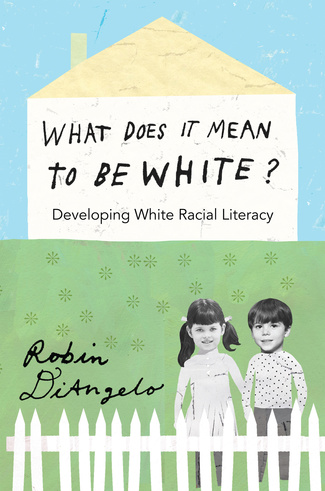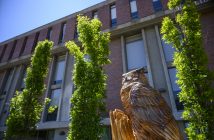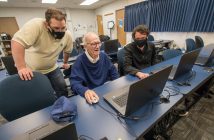Faculty members go beyond their call of duty to educate. They inspire, mentor, motivate and challenge their students to achieve their wildest dreams. And they still find time to mold their expertise and passions into published works of art. Here you will meet four professors and learn about their published books, memoirs, poems and plays and see a list of faculty who shared their accomplishments with Focus.
What Does It Mean To Be White? Developing White Racial Literacy
By Robin DiAngelo, Ph.D., Associate Professor of Education
In Dr. Robin DiAngelo’s introduction to her book, What Does It Mean To Be White? Developing White Racial Literacy, published by Peter Lang Publishing, Inc., readers quickly learn that Dr. DiAngelo’s first job after earning her bachelor’s degree in sociology was diversity trainer. What she learned from that experience was profound.
In her book, she says being a diversity trainer “provided me with the ability to understand race in a profoundly more complex and nuanced way than I had been taught by my family, in school, from the media or by society at large.”
Dr. DiAngelo earned her doctorate in multicultural education and whiteness studies so she could bring together her years of practice as a diversity trainer, and research and theory into the classroom.
“I am white, and I have over 20 years of experience leading discussions on race and racism with primarily white participants,” Dr. DiAngelo says. “I realized early on that this experience was extraordinary, given how taboo the topic is for so many white people.”
Dr. DiAngelo says she currently teaches an almost 100 percent white student population, who are living and learning in racial segregation but who cannot answer the question, “What does it mean to be white?” beyond the most superficial platitudes. “Our inability to answer this question with any depth or complexity is in part what holds that segregation in place.
“The fundamental question I wanted to answer in the book is how so many white people can live, love, study, learn, worship, play and raise families in racial segregation and still insist that race has no meaning,”
she adds.
Dr. DiAngelo says she uses examples from the cross-racial mistakes she has made and what she learned from them. “I use my position as a white person to speak to other white people,” she says. “I think that a significant part of the book’s impact is that I am speaking as an ‘insider.’ I don’t put myself outside any of the dynamics I discuss, which helps minimize defensiveness in readers.”
Dr. DiAngelo is also co-author with Ozlem Sensoy of Is Everyone Really Equal?: An Introduction to Key Concepts in Critical Social Justice Education, which won the 2012 Critics’ Choice Book Award from the American Educational Students Association (AESA) for outstanding contribution to scholarship in the Social Foundations of Education field.
Coming Home: The Elizabeth Madox Roberts Story
By Greg Neikirk, Ph.D., Professor of English
Who was Elizabeth Madox Roberts? This question and many more were answered by Dr. Greg Neikirk as he pledged to share with the world the story of Roberts’ life, rooted in Kentucky, by writing a three-act play, Coming Home: The Elizabeth Madox Roberts Story.
Dr. Neikirk, a Kentucky native, has been a member of the Elizabeth Madox Roberts Society literary group for the last 15 years. Roberts had an important impact on the literary world with her poetry, short stories and novels, but was not well known.
“While she [Roberts] gained enormous critical acclaim with her novels in the late 1920s and 1930s, her following waned in the years of World War II and following,” Dr. Neikirk says. “A writer known for her language and for the love of place, specifically her ‘Little Country’ of Kentucky, her works are now being reprinted and taught in the classroom.”
Dr. Neikirk says he wanted to demonstrate Roberts’ life and challenges through a dramatic play. “I used the research and knowledge I have discovered over the last 15 years to write an account of her life and works that comes alive on the stage.”
His play premiered in Springfield, Ky., and two members of the audience were publishers. They quickly got to work, and the play will be published soon by Des Hymnagistes Press.
The play is also educating the people living in the region where Roberts grew up, who have told Dr. Neikirk they had no idea until his play was read that their hometown author made such a splash in her first decade of writing.
“Roberts won the coveted Fiske Poetry Prize and was considered in her heyday one of the most talented writers of her time,” he adds. “B. W. Huebsch of Viking Press read her manuscripts and published her works at the same time he was launching James Joyce, H. G. Wells, D. H. Lawrence, Mahatma Gandhi and other well-known writers.”
Before becoming a professor, Dr. Neikirk was a newspaper editor in a Kentucky town where the woman who owned and published the paper knew Roberts personally before she died in 1941. “I spent 10 years with a genuine Elizabeth Madox Roberts writer
and publisher.
“The dialogue in my play came from my experience and memory more than anything else,” Dr. Neikirk says. “I am confident I captured the spirit of such women academics and scholars who helped build literacy in Kentucky.”
Dreaming of the Rain in Brooklyn
By Howard Faerstein, Adjunct and Visiting Professor of English
“It has been a lifelong dream of mine to see my poems collected in a book,” says Howard Faerstein.
Thirty-six years ago, Faerstein had a chapter book published, but it took nearly a decade to have his poems published. “The original collection kept expanding. Dreaming of the Rain in Brooklyn, published by Press 53, wasn’t built around a particular theme,” he says. “Rather, it was constructed from my life, the whole of my life.”
Faerstein says his book is one writer’s take on a way of being and surviving as a human being in a beautiful, terrifying and absurd world. “There are poems about childhood, my parents, my living through the 60s, the jobs that I’ve had. There are political poems that were written in response to political events; poems of exile and return; poems of love and the end of love; poems evoked by the natural world; poems that attempt to paint every space of white on the canvas and those that focus on the tiny corner hidden by the clouds.”
Xylotheque: Essays
By Yelizaveta (Lisa) Renfro, Ph.D., Assistant Professor of English
Just released in April 2014 through the University of New Mexico Press, Xylotheque: Essays began first as one essay that was published in the North American Review. Over a period of eight years, Dr. Yelizaveta (Lisa) Renfro continued to write a collection of personal essays that were all linked by the common theme of trees.
“This book is completely about myself and my own experiences,” Dr. Renfro says. “It is a memoir-in-essays, a work of creative nonfiction, and so I am completely present in every piece. Although the pieces are all separate and distinct essays in their own right, taken together they build on one another, accruing like the rings of a tree, building the story of a life.”
One of Dr. Renfro’s essays that originally appeared in the Alaska Quarterly Review was reprinted in Reader’s Digest a few years ago. The essay, titled “Quercus” (that was retitled “The Wisdom of the Oak”), created a plethora of responses from readers across the country. “The essay is about the oak tree that grew in my yard in Omaha, Neb., and also about working as a police reporter,” she says. “Readers from all over the country were very moved and wanted to share stories about their own trees.”
The title Xylotheque is a word meaning “collection of wood.” Dr. Renfro says she took a long time searching for the title, but ultimately the word captures the spirit of her book. “I simply liked the word,” she says. “It’s unusual and intriguing. The word ‘xylotheque’ makes the connection to trees, but it also underscores the idea that each essay is like a specimen in a collection.”
Dr. Renfro’s essays, many of which are paired with her personal photographs of trees, highlight the Petrified Forest National Park in northeastern Arizona, walking among redwood trees and growing up in a bilingual household in Southern California.
Dr. Renfro has a blog that has short excerpts from her book and additional photographs that did not make it into the book. Visit chasingsamaras.blogspot.com and click “Read My Work.”
Xylotheque is Dr. Renfro’s second book. She also wrote a collection of short stories, A Catalogue of Everything in the World, that won the St. Lawrence Book Award and is available from Black Lawrence Press.
Other published works
These faculty and staff members also published works:
Megan S. Kennedy, Ph.D., assistant professor of Education, wrote Safe Spaces: Making Schools and Communities Welcoming to LGBT Youth, with co-authors Annemarie Vaccaro and Gerri August.
Dr. Kennedy says, “This book has been used as a book club selection in different parts of the country as well as a professional development text. This has been in schools, community organizations and smaller interested parties. This is exactly how we hoped it would be used. Additionally, my co-authors and I have presented locally and nationally on different aspects of the book to bring the messages/lessons of the book to educators, faculty and individuals working with LGBT youth. It is our hope that this education is making a small change to the schools and communities and our LGBT youth are finding the advocates and support they need to thrive.”
Siddharth Lodaya, Campus Center administrative assistant, recently published his book Lift Yourself Up: A Guide and Companion for the Seeker of Personal Growth, which is about self-help and meditation.
George Michael, Ph.D., assistant professor, Criminal Justice, wrote a book, Extremism in America, published by University Press of Florida. He shared a lecture about his book on C-Span’s BookTV program in May. You can see his lecture online at booktv.org and search “extremism in America.” He was also featured on C-Span last year, lecturing about his book Lone Wolf Terror and the Rise of Leaderless Resistance.
Leah Nielsen, associate professor of English, wrote her book Side Effects May Include, published by The Chapbook Journal. The book is a collection of experimental poems in response to the medical establishment and her own experiences as a chronic pain patient.
Brooke Orr, Ph.D., associate professor of History, wrote The “People’s Joan of Arc”: Mary Elizabeth Lease, Gendered Politics and Populist Party Politics in Gilded-Age America, published by Peter Lang Publishing, Inc.
Katherine Walsh, Ph.D., professor of Social Work, wrote the second edition to her textbook Grief and Loss: Theories and Skills for the Helping Professions, published by Pearson. Dr. Walsh says, “A great deal of myself and my over 30 years of work in the oncology and hospice field is in the text…The chapter on professional resilience is especially meaningful to me, because when I started in the field of oncology social work, there was not much on this topic to guide professional helpers. I’ve also learned so much from students and their cultural and spiritual beliefs from their responses to the text and the experiential assignments in it, and this has really broadened my own knowledge base and practice effectiveness.” n




